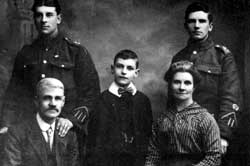 |
|||
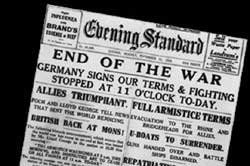
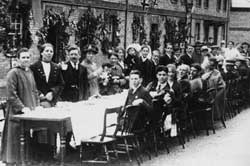 Armistice Party in Bridge Street New Bradwell in 1918 |
On 11th November 1918 the Armistice was signed and the First World War came to an end. For young children in Wolverton like George Cook the enormity of this announcement had little impact.
|
||
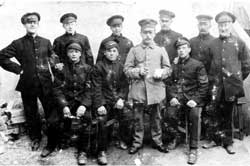 Hawtin Mundy (third from right) at a POW camp in Domnau, East Prussia |
Whilst the news of the Armistice was being received with wild enthusiasm in Wolverton and New Bradwell, in Germany Hawtin Mundy was a prisoner of war working in a small village in East Prussia. He had learned to speak German well, and was on good terms with his boss in the village sawmill. The Great War was over. The adventure that so many young men had rushed to get involved in because they thought they might miss the fun had finished. The Armistice was celebrated madly by everybody, but it was also a time to pause and reflect on the costs, the human costs, incurred. Wolverton and New Bradwell with a combined population of 9,000, lost 200 of their menfolk dead. The number who were wounded, physically and mentally, far surpassed those who were killed. It took some time for the soldiers to be demobbed - in fact those who had been prisoners were some of the first men to return permanently to their homes. Ada Croft's brother was one of those. Hawtin Mundy arrived home too from his prisoner of war camp in Germany Back came the soldiers, and those with jobs in the Railway Works regained their jobs as promised, and the women who had taken their places lost theirs, but the men were returning to a town which like the rest of the country was suffering a post-war depression as Frank Gillard remembers. We cannot go back to 1918 and collect the old soldiers’ reactions to their part in the War, we can only ask them if, with their benefit of many years of hindsight, was it really worth it? To those of us who are younger and looking back at the slaughter of so many young men in a seemingly senseless struggle makes us wonder why on earth the war took place. Hawtin Mundy’s message to his former comrade reminding him that he held his head high with pride when fighting, but now would be bowed in shame, needs some explanation and the explanation gives us the key to the feelings of 1914, the feelings that enabled men to endure the most horrible war in history. |
||
|
|||
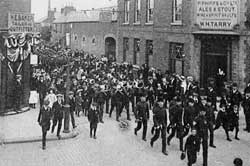 The return of the Wolverton Companies of the 1st Bucks Battalion in 1919 marching up Radcliffe Street Wolverton |
It might have been because it was too horrible for them to remember, it might have been because they wanted to spare their loved ones, it might have been because their experience had set them apart from those who stayed behind, but the men who came back didn’t talk about their war much, and few people asked them about it either. They may not have talked about it, but they didn’t forget, and over the years the memories filled their dreams and nightmares. For May Brooks, it wasn't until many years later that she realised the horrible legacy of the war. We will give the final words to New Bradwell man Hawtin Mundy, who some 60 years after he'd been a soldier in the First World War, reflected on just who were the heroes and cowards in that war. |
||
|
Home | Part One | Part Two | Part Three | Part Four | Part Five | About this site
|
|||

